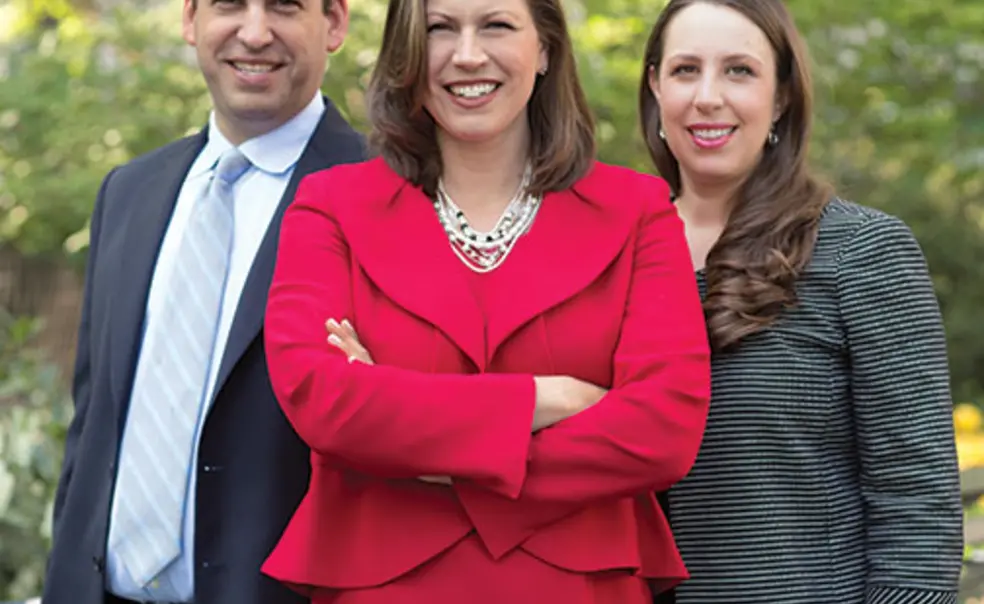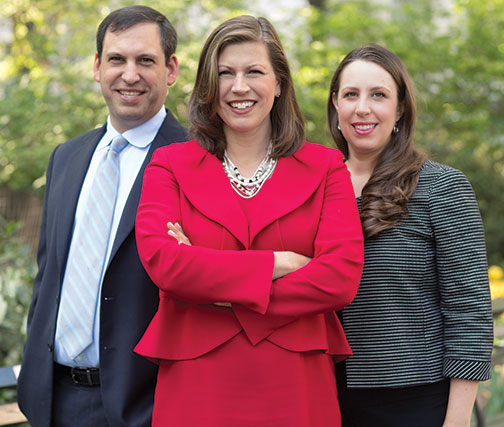Hannah Smith '95, Mark Rienzi '97, and Adele Keim '01: A Stand for Religious Rights
At the Becket Fund, three alumni help land a Supreme Court victory with the Hobby Lobby case
When the U.S. Supreme Court ruled in favor of the family-owned craft-store chain Hobby Lobby in its suit against the government last June, the decision was a high-profile victory for the Becket Fund for Religious Liberty, a nonprofit law firm based in Washington, D.C. Among the lawyers who worked on the case for the Becket Fund were Hannah Smith ’95, Mark Rienzi ’97, and Adele Keim ’01. They argued that a privately held business should not be required by the new health-care law to provide contraception that violated the religious beliefs of its owners.
Smith, who clerked for Justice Samuel Alito ’72 before joining the Becket Fund, credits Princeton for teaching her to “celebrate the religious diversity on campus,” she says.
For Rienzi, what “lit the fire” was a case in which Illinois mandated that pharmacists fill prescriptions for emergency contraception, he says. Rienzi worked for six years on behalf of the pharmacists, who objected because of their religious beliefs and ultimately won the case. Since he joined the Becket Fund, “I’ve had the most fun of my career,” he says.
Hobby Lobby was an “all-hands-on-deck situation,” Keim says, because a government deadline would have levied fines on businesses that did not comply.
Politics professor Robert George serves on the board of the Becket Fund and taught Smith and Keim. Hobby Lobby’s cause was embraced by Republicans but, Smith points out, “we represent people on both sides of the aisle and of all faiths.” In January, Becket Fund lawyers successfully argued that a Muslim prisoner in Arkansas should be allowed to grow a beard despite prison restrictions.
“Our outlook is very much ‘religious freedom is alive and well in America,’” says Smith, “and we’re here to make sure to keep it that way.”













2 Responses
Emily S. Klein
10 Years AgoA Legal Quagmire
I was shocked to see your article, “A Stand For Religious Rights” (Princetonians, June 3) — shocked to see such cases equated with religious rights.
The Hobby Lobby case is a quagmire that equates corporations with people and allows bosses to impose their religious beliefs on their employees. It also is based on the false premise that some forms of contraception (morning-after pills and IUDs) cause abortions. They do not. More frustrating than the Hobby Lobby case was the inclusion of Mark Rienzi ’97’s work arguing for the religious “right” of pharmacists to not do their job and be allowed to deny emergency contraception to women. This is not a fight for religious freedom; this is imposing your religion on other people, regardless of their circumstances, beliefs, or needs.
Moreover, all of these “religious freedom” cases basically say that family planning and contraception are not basic health care. They are, for both women and men. Being able to plan pregnancies and, yes, use emergency contraception when necessary is critical for the lives of millions of women — and men — across this country. It is high time we recognized it as such, and not as a battleground for “religious freedom.” Would you have companies or business owners deny services to gay couples or people of different races or religion?
While certainly we can acknowledge the ability of Princetonians to argue and win difficult legal cases, glorifying those cases under the guise of “a stand for religious rights” ignores the greater and more important context. These cases were not about religious freedom being “alive and well” at all.
Vane Lucas ’83
10 Years AgoHobby Lobby Case's Meaning
In her letter to PAW (Inbox, July 8), Emily Klein suggests that the Hobby Lobby case “allows bosses to impose their religious beliefs on their employees.” Ms. Klein is seriously mistaken. The case has nothing to do with the birth-control choices made by employees of Hobby Lobby. The owners of Hobby Lobby have not prevented any employee from using whatever form of birth control the employee chooses. What the owners have done is seek (and gain) legal agreement that the owners should not be forced to pay for forms of birth control that violate their religious beliefs. That sounds like religious freedom to me. No beliefs are being imposed on anyone.